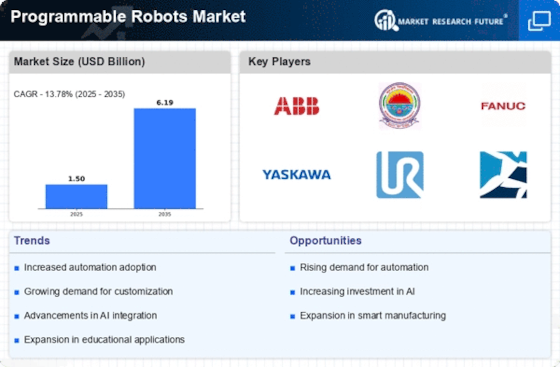Top Industry Leaders in the Programmable Robots Market

Competitive Landscape of Programmable Robots Market
The programmable robots market, encompassing robots that can execute user-defined instructions, is experiencing a dynamic surge. Driven by the convergence of advancements in artificial intelligence, sensor technology, and intuitive programming interfaces, promising lucrative opportunities for players across various segments. However, navigating this burgeoning market requires comprehensive understanding of the competitive landscape, adopted strategies, key factors influencing market share, and the emergence of new players shaping the future.
Key Players
-
iRobot Corporation
-
The LEGO Group
-
RobotShop Inc.
-
Bossa Nova Robotics
-
Honda Motor Co. Ltd
-
Wowwee Group Ltd
-
SuperDroid Robots Inc.
-
Fischertechnik GmbH
-
Evolution Robotics
Strategies Adopted by Key Players:
Success in the programmable robots market hinges on adopting effective strategies. Differentiation remains a key weapon, with companies striving to stand out through unique features, advanced capabilities, or user-friendly programming interfaces. Bosch, for example, differentiates its educational robots through integration with real-world applications, while Pi Robotics focuses on open-source hardware and software, fostering a collaborative learning environment.
Cost leadership also plays a vital role, particularly in attracting budget-conscious consumers. Companies like Wonder Workshop, with its affordable Dot and Dash robots, cater to the educational market by offering value-driven solutions.
Additionally, market segmentation allows companies to tailor their offerings to specific customer needs. Ubtech, for example, excels in the humanoid robot segment, while Robo Wunderkind focuses on therapeutic robots for children with special needs. By understanding and catering to diverse customer segments, companies can expand their market reach and secure a stronger foothold.
Factors Defining Market Share:
Analysing market share in the programmable robots market requires careful consideration of several factors. Firstly, the target market segment plays a crucial role. Companies focusing on the educational segment, like Lego, may not directly compete with those targeting industrial applications, like ABB.
Secondly, technological advancements can rapidly shift market dynamics. Companies at the forefront of AI integration, sensor fusion, or intuitive programming interfaces gain a significant edge. Boston Dynamics' Atlas humanoid robot, capable of parkour and complex movements, exemplifies the potential of cutting-edge technology to disrupt the market.
Finally, brand reputation and community engagement are crucial differentiators. Companies like Raspberry Pi, with its strong developer community and open-source philosophy, attract dedicated followers, bolstering their market share.
New Entrants and Emerging Trends:
The programmable robots market is constantly evolving, attracting new players with innovative ideas. Companies like Doosan Robotics, focusing on collaborative robots for industrial applications, and Misty Robotics, developing social robots for human interaction, represent the diversifying landscape.
Furthermore, emerging trends like cloud robotics and edge computing, enabling remote management and decentralized intelligence, are creating new opportunities. Companies like Fetch Robotics, with its cloud-connected Fetch mobile manipulators, are at the forefront of this revolution.
Latest Company Updates
iRobot Corporation
- Create 3 Educational Robot (October 2023): iRobot launched the next generation of its popular Create robot, featuring a buildable design, improved sensors, and expanded programming capabilities. This versatile platform caters to both beginners and advanced users, supporting basic behaviors and complex applications like multi-robot exploration and telepresence.
The LEGO Group
- Spike Prime Robotics Kit (2020): LEGO introduced the Spike Prime kit, designed for middle school STEM education. This advanced kit combines LEGO building blocks with sensors, motors, and a programmable hub, allowing students to build and program robots for various tasks and challenges.









